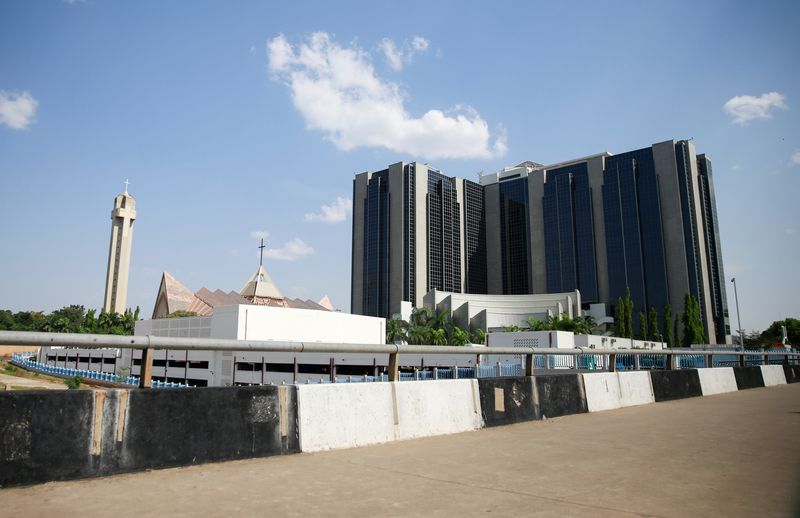Nigeria raises rates again to halt continued inflation rise
2023.05.24 12:04

© Reuters. FILE PHOTO: A view of Central Bank of Nigeria headquaters next to National Ecumenical Centre in Abuja, Nigeria November 23, 2021. REUTERS/Afolabi Sotunde
By Chijioke Ohuocha and Camillus Eboh
ABUJA (Reuters) -Nigeria’s central bank raised its main interest rate by another 50 basis points to 18.50% on Wednesday, and its governor promised to sustain rate hikes for as long as price pressures remained elevated in Africa’s biggest economy.
Inflation struck a more than 17-year high of 22.22% in April versus 22.04% in March, despite a Central Bank of Nigeria (CBN) hiking cycle stretching back to May 2022. Including Wednesday’s hike, the bank has now raised rates by 700 basis points.
CBN Governor Godwin Emefiele told a news conference that the monetary policy committee saw the continued rise in inflation as still “the biggest challenge confronting macroeconomic stability in Nigeria”.
He said policy rate hikes had prevented inflation rising by about 8 percentage points over the past year.
“The MPC (Monetary Policy Committee) therefore opted to tighten, though moderately, to indicate (its) conviction that current policy stance is moderating the rising inflation,” Emefiele said.
Double-digit inflation, which has eroded savings and wages, is one of the biggest issues that will confront president-elect Bola Tinubu when he is sworn into office on Monday.
Tinubu has promised to remove a popular but costly petrol subsidy and let the market determine the exchange rate, among other policies.
“The increasing likelihood of fuel subsidy cuts and a devaluation of the naira under the incoming Tinubu administration means that the risks are tilted towards further tightening in the coming months,” said Jason Tuvey, deputy chief emerging markets economist at Capital Economics.
Statistics agency data showed earlier on Wednesday that first-quarter economic growth in Nigeria slowed to about 2.3%, hurt by a government plan to swap old banknotes for newly designed ones which disrupted trade and payments.








